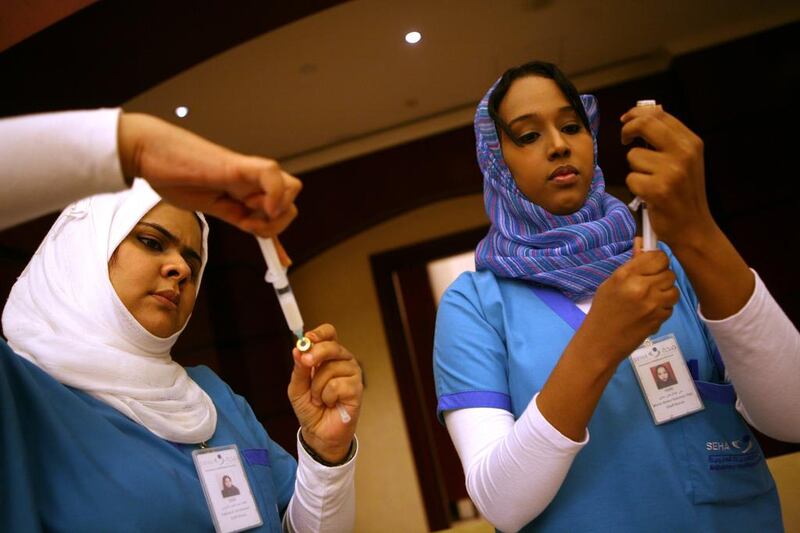DUBAI // Employers in the UAE are being urged to have their staff vaccinated against influenza to minimise lost working hours.
In many countries the flu is one of the biggest causes of short-term illness and can harm business through the number of sick days taken.
“If organisations are considering a plan to vaccinate staff, now is the time to act,” said Dr Issam Badaoui, the medical director for International SOS, a Dubai-based company of experts on global health issues.
The vaccine is effective in preventing flu among healthy adults, and a drive to protect staff against the virus makes economic sense, said Dr Badaoui.
“Vaccinating a workforce can have a noticeable, positive effect on an organisation’s lost hours due to sickness,” he said.
In the United States, 111 million workdays are lost during each flu season, costing about US$7 billion (Dh25.7bn) a year in sick days, the US government says.
“The influenza vaccine may also aid the identification of non-seasonal viruses, such as Mers CoV, by eliminating flu as a potential cause of illness if an employee becomes unwell,” said Dr Badaoui.
The virus can effect anyone, but children under 5, people aged 65 and over, and pregnant women are at greater risk.
Symptoms can include a fever, sore throat, headache, fatigue, runny or stuffy nose, muscular or body aches, and sometimes vomiting and diarrhoea.
UAE residents who are planning to travel in the northern hemisphere, where the virus is most prevalent during the winter months, are urged to be extra vigilant.
In the southern hemisphere, most activity occurs from April until the end of September, while in the tropics the risk of exposure exists all year round.
“Flu spreads from one person to another through coughing, sneezing and talking,” said Dr Badaoui.
“Someone who has the flu may pass the illness to others even before they show signs of being sick, and may remain contagious for about a week.”
The flu can be mild or severe and can lead to serious complications.
Those with underlying health conditions are at higher risk of complications such as pneumonia, bronchitis, and sinus and ear infection, while it can worsen conditions such as diabetes and asthma.
“Although there are antiviral medications, which are generally used to treat people more likely to get a severe illness, vaccination remains important to prevent flu,” said Dr Badaoui.
Vaccination needs to be repeated annually, as flu viruses change. The prevalence of specific strains varies each year but vaccines offer protection from the most likely strains, said Dr Badaoui.
“One year’s vaccine is not necessarily effective against the viruses that will circulate widely the next year,” he said.
“As we move into the cooler months, it is particularly important that people take precautions to reduce the risk of contracting influenza.”
While the best way to protect against the flu is vaccine, there are other things people can do to keep themselves healthy through the winter, said Dr Badaoui.
“Ensuring you get enough sleep, drinking plenty of fluids and paying particular attention to personal hygiene, including regular hand washing, can be effective in reducing the chances of contracting the virus,” he said.
The World Health Organisation estimates that between 5 and 10 per cent of adults, and 20 to 30 per cent of children, are infected with the flu each year.
jbell@thenational.ae





